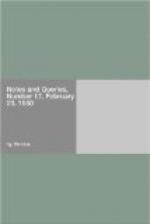Izaac Walton speaks of William Basse, “one that hath made the choice songs of the Hunter in His Career, and of Tom of Bedlam, and many others of note.” The ballad mentioned by MR. COLLIER, “Maister Basse his Career, or the Hunting of the Hare,” is undoubtably the one alluded to by Walton. I may add, that it is printed in Wit and Drollery, edit. 1682. p. 64.; and also in Old Ballads, 1725, vol. iii. p. 196. The tune is contained in the Shene MS., a curious collection of old tunes in the Advocate’s Library, Edinburgh; and a ballad entitled Hubert’s Ghost, to the tune of Basse’s Carrier, is preserved among the Bagford Collection of Old Ballads in the British Museum. With regard to the second ballad mentioned by Walton, our knowledge is not so perfect. Sir John Hawkins in a note (Complete Angler, 5th edit. p. 73.) says:—
“This song, beginning—
‘Forth from my dark
and dismal cell,’
with the music to it, set by Hen. Lawes, is printed in a book, entitled Choice Ayres, Songs and Dialogues, to sing to the Theorbo Lute, and Bass Viol, folio. 1675, and in Playfield’s Antidote against Melancholy, 8vo. 1669, and also in Dr. Percy’s Reliques of Ancient English Poetry, vol. ii. p. 350; but in the latter with a mistake in the last line of the third stanza, of the word Pentarchy for Pentateuch.”
A copy of the Choice Ayres, 1675, is now before me, but Henry Lawes’s name does not appear to the song in question. Sir John has evidently made a mistake; the air of Mad Tom was composed by John Cooper, alias Giovanni Coperario, for one of the Masques perfomed by the Gentlemen of Gray’s Inn. (See The English Dancing Master, 1651, in the British Museum, and Additional MS. 10,440, in the same repository.) With regard to the ballad itself, there is an early copy (of the latter part of the sixteenth century) {266} preserved in the Harleian MSS., No. 7332, fol. 41. It purports to have been
“Written (i.e. transcribed) be Feargod Barebone, who being at many times idle and wanting employment, wrote out certain songs and epigrams, with the idea of mending his hand in writing.”
There is another copy among Malone’s MSS. in the Bodleian (No. 16. p. 55.), where it is entitled A new Tom of Bedlam. But I contend there is no evidence to show that this is the ballad alluded to by Walton; none of the copies having the name of the author. We have two other songs (probably more) bearing the same title of Tom of Bedlam; one beginning, “From the top of high Caucasus;” the other commencing, “From the hag and hungry goblin;” either of which are quite as likely to have been intended as that mentioned above.
It still remains a question, I think, which of the two Basses was the author of the ballads mentioned by Walton. But I have already trespassed so long upon your valuable space that I will leave the further consideration of the subject until a future period: in the meantime, perhaps some of your correspondents may be enabled to “illuminate our darkness” upon the various knotty points.




